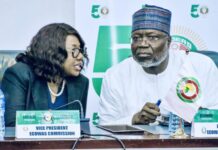 A global investment firm with strong expertise in asset backed mortgage securities, Cantor Fitzgerald is investing $1 billion (about N200 billion) in the Nigerian mortgage sector.
A global investment firm with strong expertise in asset backed mortgage securities, Cantor Fitzgerald is investing $1 billion (about N200 billion) in the Nigerian mortgage sector.
The firm has also made arrangements to build 10,000 houses in Kaduna, Lagos, Enugu and Abuja within the next one year.
Representative of the firm, Mr Jack Heffernan, Managing Director of the firm’s Debt Capital Markets division, signed an MOU with Professor Charles Inyangette, CEO of the Nigerian Mortgage Refinance Company (NMRC) in a ceremony presided over by the Coordinating Minister for the Economy and Minister of Finance, Dr Ngozi Okonjo-Iweala earlier today.
Okonjo-Iweala said that the entry of such an important player into Nigeria’s mortgage sector is yet another signal that the Jonathan administration’s vision on making affordable housing available to Nigerians is earning the confidence of serious international investors. She said that the prospects of achieving the core vision of the NMRC which is to get young Nigerians convenient access to the means of owning their own homes is achieved.
“Cantor Fitzgerald’s presence in Nigeria shows that our mortgage strategy is attracting the right kind of attention from the right kind of people around the world and this will deepen and diversify and ultimately reduce the cost of mortgage and housing in Nigeria. This shows that President Jonathan’s vision of making housing available to Nigerians is working “, said Okonjo-Iweala.
Mr Hefernan described the NMRC as “exactly the right business model to bring liquidity to Nigeria’s housing sector”.
Speaking during the event ,Okonjo-Iweala said “It marks a crucial milestone in a process that began in January 2014 when HE President Goodluck Ebele Jonathan, GCFR launched the NMRC. NMRC is primarily a liquidity facility designed to expand the primary and secondary mortgage markets by bridging the lending costs of mortgages so that lending institutions can lend more and for tenors of up to 20 years.
“Mr. President saw the set up of the NMRC as being a crucial component of his Transformation Agenda with a view to achieving the twin goals of jobs creation and economic growth/development. This was done in recognition of the importance of housing construction to Nigeria’s long-term growth prospects – particularly when supported by a vibrant mortgage industry.
“Home ownership is a fundamental need. That large numbers of Nigerians dream of home ownership is not in doubt, indeed the success of the First 10,000 Mortgages for Affordable Homes Scheme we launched in July 2014 is further testimony to this fact. It was more than six times over-subscribed with over 66,000 applications. Close to 25,000 of these applications have been processed and pre-qualified and over 9,000 given offer letters.
“We are working on a number of initiatives to make sure many more Nigerians are able to take up the mortgage offers irrespective of the challenges they face including meeting the required down payment. For example, we are at advanced stages of discussions with the National Pension Commission on an arrangement whereby Nigerian workers are able to make a one-time deduction from their retirement savings account to make this down payment on their homes, among other initiatives.
The minister said “The significance of the collaboration between NMRC and Cantor is that it will enhance the global credibility of Nigeria’s mortgage market; Nigeria will be counted among the league of nations with world-class mortgage security platforms. Liquidity will be made available through the securitisation programme to be put in place by Cantor Fitzgerald. We expect this exercise to be completed within the next seven to eight months. Nigerian PMIs whose function is to sell mortgages to would-be home buyers, can continually do so, for tenors of up to 20-years, because liquidity will no longer be an issue.
“As foreign capital is channelled into Nigerian mortgage securities NMRC will continually refinance these mortgages and the PMIs can continue to originate new mortgages over and over again – essentially like an assembly line. The end result of this will be more profitable and better capitalised PMIs and lower mortgage interest rates which will ultimately fall to single digits. This will attract even more Nigerians into the housing market, especially first-time home owners, and a consistent and significant increase in the supply of affordable housing units.
She said further that “As more houses are built, more jobs will be created – more construction workers are employed and they in turn spend more money on goods and services. The recipients of that extra money, in turn, spend more money on goods and services and the process continues. Higher housing construction means increased demand for steel, sand, cement, windows, doors etc. This increased economic activity translates to higher incomes and higher GDP growth rates.



